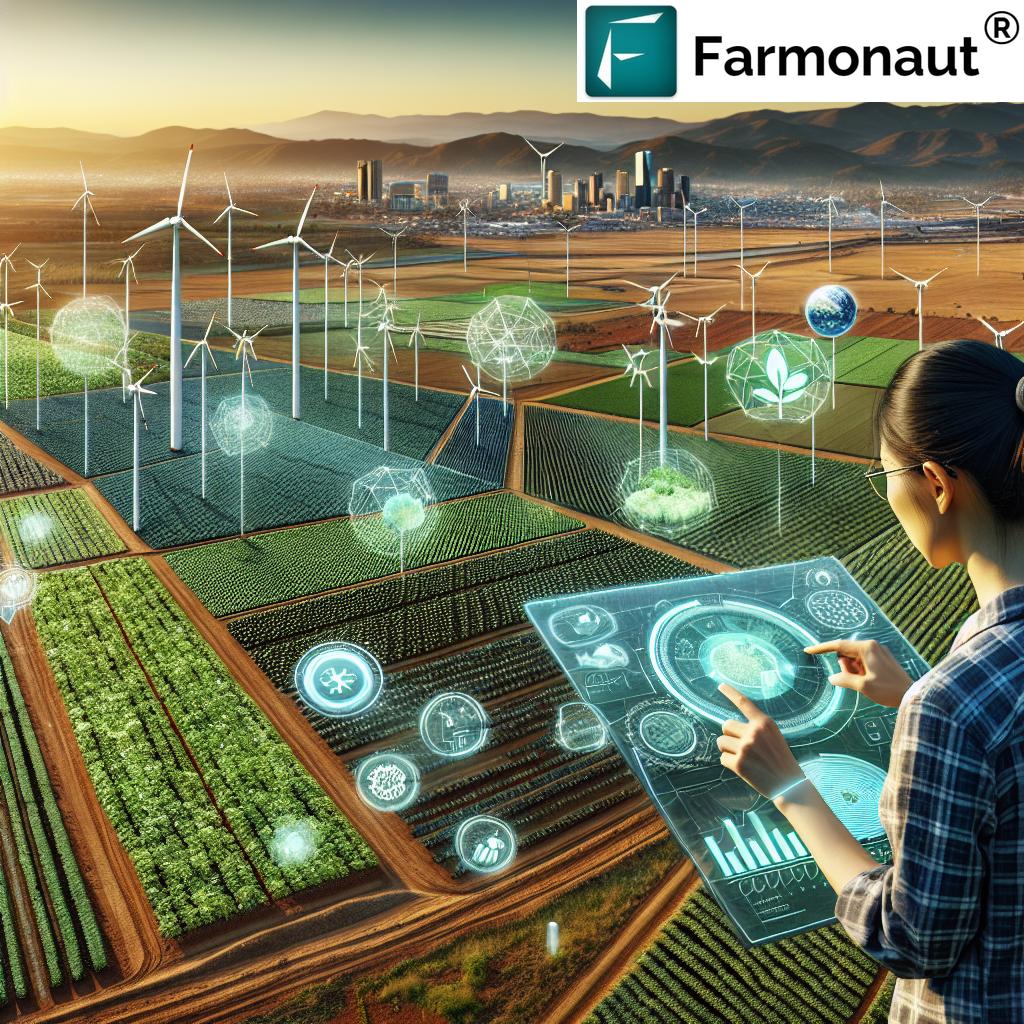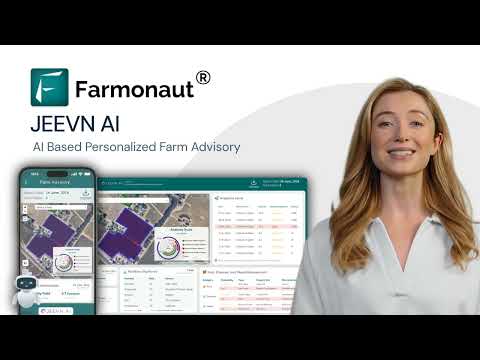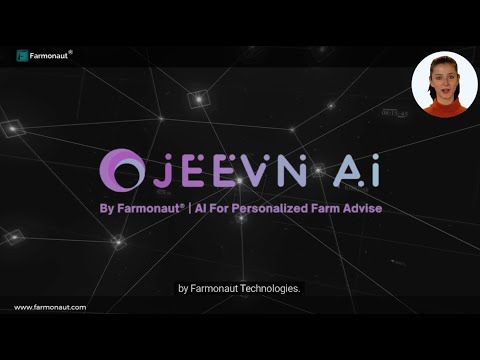Revolutionizing Canberra’s Agriculture: How Farmonaut’s AI-Powered Precision Farming Tackles Climate Change
“By 2025, Generation Beta will emerge, experiencing agriculture where AI and digital solutions are commonplace in farming.”
As we approach the dawn of a new era in agriculture, we find ourselves at the forefront of a technological revolution that promises to reshape the way we cultivate our lands and feed our growing population. In Canberra, the capital city of Australia, this transformation is taking root with the emergence of AI-powered precision farming techniques that are not only boosting productivity but also addressing the pressing challenges of climate change.
At the heart of this agricultural metamorphosis lies Farmonaut, a pioneering company that is harnessing the power of digital agriculture solutions to empower farmers and revolutionize the industry. As we delve into the intricacies of this technological leap, we’ll explore how Farmonaut’s innovative approach is paving the way for a more sustainable and resilient future for Canberra’s agriculture.
The Dawn of Generation Beta: A New Era in Farming
As we stand on the cusp of 2025, we’re witnessing the birth of Generation Beta, a cohort that will grow up in a world where the lines between physical and digital realms are increasingly blurred. This generation, born between 2025 and 2039, will be the first to experience a truly integrated digital-physical environment, where AI in farming is not just a novelty but a fundamental aspect of agricultural practices.
For Generation Beta, concepts like autonomous transportation, wearable health technologies, and immersive virtual environments will be as commonplace as smartphones are to us today. This technological immersion will extend to every facet of their lives, including the way they perceive and interact with the agricultural sector.

Farmonaut: Pioneering the Future of Agriculture
In this rapidly evolving landscape, Farmonaut stands as a beacon of innovation, offering cutting-edge precision agriculture technology that is reshaping the agricultural sector in Canberra and beyond. By leveraging advanced satellite imagery, artificial intelligence, and machine learning algorithms, Farmonaut provides farmers with unprecedented insights into their crops and land.
The company’s suite of tools includes:
- Satellite-Based Crop Health Monitoring: Real-time tracking of vegetation health, soil moisture levels, and other critical metrics.
- Jeevn AI Advisory System: An AI-driven tool that delivers personalized farm advice and weather forecasts.
- Blockchain-Based Product Traceability: Ensuring transparency and security throughout the agricultural supply chain.
- Fleet and Resource Management: Optimizing the use of agricultural machinery and resources.
- Carbon Footprinting: Helping agribusinesses monitor and reduce their environmental impact.
These innovative solutions are not just enhancing productivity; they’re fundamentally changing the way farmers approach their work, making agriculture more precise, efficient, and environmentally friendly.
Smart Farming Techniques: The Cornerstone of Sustainable Agriculture
As we navigate the challenges of the 21st century, smart farming techniques have emerged as a critical component of sustainable agriculture. Farmonaut’s technology is at the forefront of this movement, offering farmers in Canberra and across Australia the tools they need to implement climate-smart agriculture practices.
These techniques include:
- Precision Irrigation: Using satellite data and AI to optimize water usage, crucial in Australia’s often drought-prone climate.
- Targeted Fertilizer Application: Reducing waste and environmental impact by applying fertilizers only where and when needed.
- Pest Management: Early detection and targeted treatment of pest infestations, minimizing the use of pesticides.
- Crop Rotation Planning: AI-assisted planning for optimal crop rotation to maintain soil health and biodiversity.
By adopting these smart farming techniques, Canberra’s farmers are not only improving their yields but also contributing to the fight against climate change by reducing resource consumption and minimizing their carbon footprint.
Agricultural Data Analytics: Empowering Informed Decision-Making
In the era of big data, agricultural data analytics has become an indispensable tool for modern farmers. Farmonaut’s platform harnesses the power of data to provide farmers with actionable insights that drive better decision-making.
Key aspects of Farmonaut’s data analytics include:
- Yield Prediction: Using historical data and AI algorithms to forecast crop yields with remarkable accuracy.
- Resource Optimization: Analyzing patterns in resource usage to identify areas for improvement and cost reduction.
- Market Trends Analysis: Providing insights into market demands to help farmers plan their crops more effectively.
- Climate Impact Assessment: Evaluating the potential impacts of climate change on specific crops and regions.
By leveraging these powerful analytics tools, Canberra’s farmers are gaining a competitive edge in an increasingly challenging agricultural landscape.
“Farmonaut’s precision agriculture technology offers smart farming techniques for sustainable crop management across Canberra’s diverse landscapes.”
Remote Sensing for Agriculture: A Bird’s-Eye View of Crop Health
Remote sensing for agriculture has revolutionized the way we monitor and manage crops. Farmonaut’s satellite-based technology provides farmers with a comprehensive, real-time view of their fields, allowing them to detect issues early and respond proactively.
Benefits of remote sensing in agriculture include:
- Early Detection of Crop Stress: Identifying areas of poor plant health before visible symptoms appear.
- Soil Moisture Mapping: Creating detailed maps of soil moisture levels to optimize irrigation.
- Crop Yield Estimation: Providing accurate yield estimates to help with harvest planning and market forecasting.
- Land Use Classification: Assisting in land management and conservation efforts.
By harnessing the power of remote sensing, Canberra’s farmers are gaining unprecedented insights into their crops, enabling them to make data-driven decisions that optimize yield and minimize environmental impact.

Sustainable Crop Management: Balancing Productivity and Environmental Stewardship
As we face the challenges of climate change and increasing food demand, sustainable crop management has become more critical than ever. Farmonaut’s technology is helping Canberra’s farmers achieve this delicate balance by providing tools that optimize productivity while minimizing environmental impact.
Key aspects of sustainable crop management enabled by Farmonaut include:
- Precision Nutrient Management: Tailoring fertilizer application to specific crop needs, reducing waste and runoff.
- Water Conservation: Implementing smart irrigation systems that use water more efficiently.
- Integrated Pest Management: Utilizing AI to predict pest outbreaks and implement targeted control measures.
- Soil Health Monitoring: Tracking soil quality over time to maintain long-term fertility.
By adopting these sustainable practices, Canberra’s farmers are not only ensuring their own long-term viability but also contributing to the broader goals of environmental conservation and food security.
Agricultural Automation Systems: The Future of Farming
As we look towards the future, agricultural automation systems are set to play an increasingly important role in farming. Farmonaut’s technology is paving the way for this automation revolution, integrating seamlessly with a wide range of smart farming equipment.
Examples of agricultural automation supported by Farmonaut include:
- Autonomous Tractors: Self-driving tractors that can perform tasks with precision and efficiency.
- Robotic Harvesters: Machines that can identify and harvest ripe crops with minimal human intervention.
- Drone-Based Crop Monitoring: Using drones to supplement satellite data for even more detailed crop analysis.
- Automated Irrigation Systems: Smart systems that adjust water delivery based on real-time soil moisture data.
These automation systems, guided by Farmonaut’s AI and data analytics, are helping Canberra’s farmers increase productivity, reduce labor costs, and improve the overall efficiency of their operations.
Crop Health Monitoring: The Key to Proactive Farm Management
Crop health monitoring is a critical aspect of modern agriculture, and Farmonaut’s technology is at the forefront of this field. By providing real-time, detailed information about crop health, Farmonaut enables farmers to address issues proactively, minimizing losses and optimizing yields.
Key features of Farmonaut’s crop health monitoring system include:
- Vegetation Index Mapping: Creating detailed maps of crop health using normalized difference vegetation index (NDVI) data.
- Disease Detection: Early identification of potential disease outbreaks based on subtle changes in crop appearance.
- Nutrient Deficiency Analysis: Detecting signs of nutrient deficiencies before they become visible to the naked eye.
- Growth Stage Monitoring: Tracking crop development to optimize the timing of various farming activities.
By leveraging these advanced monitoring capabilities, Canberra’s farmers can intervene early when issues arise, ensuring healthier crops and higher yields.
The Impact of Climate Change on Canberra’s Agriculture
As we confront the realities of climate change, Canberra’s agricultural sector faces significant challenges. Rising temperatures, changing rainfall patterns, and increased frequency of extreme weather events all pose threats to traditional farming practices.
However, Farmonaut’s technology is helping farmers adapt to these challenges by:
- Climate-Resilient Crop Selection: Using AI to recommend crops that are better suited to changing climate conditions.
- Drought Management: Implementing water-saving techniques based on precise soil moisture data.
- Extreme Weather Preparedness: Providing early warnings and recommendations for protecting crops from severe weather events.
- Long-term Climate Trend Analysis: Helping farmers plan for future climate scenarios and adjust their practices accordingly.
By embracing these climate-smart approaches, Canberra’s farmers are not only protecting their livelihoods but also contributing to the broader efforts to mitigate and adapt to climate change.
The Role of Education and Research in Shaping the Future of Agriculture
As we prepare for the agricultural challenges of the future, education and research play crucial roles in equipping the next generation of farmers with the knowledge and skills they need to succeed. Farmonaut is actively contributing to this effort by:
- Partnering with Educational Institutions: Collaborating with universities and agricultural schools to integrate precision farming technologies into curricula.
- Providing Training Programs: Offering workshops and online courses to help farmers master the use of Farmonaut’s technology.
- Supporting Agricultural Research: Sharing data and insights with researchers to advance our understanding of sustainable farming practices.
- Fostering Innovation: Encouraging the development of new applications and use cases for precision agriculture technology.
By investing in education and research, we’re ensuring that Canberra’s agricultural sector remains at the forefront of innovation, ready to meet the challenges of the future.
The Global Context: Canberra’s Role in Addressing World Hunger
As we consider the global challenges of food security and population growth, Canberra’s agricultural sector has an important role to play. By adopting advanced farming technologies like those offered by Farmonaut, Canberra’s farmers are not only improving their own productivity but also contributing to the broader goal of feeding a growing world population.
Key ways in which Canberra’s agriculture is making a global impact include:
- Increased Crop Yields: Producing more food on existing farmland to help meet rising global demand.
- Sustainable Practices: Demonstrating how agriculture can be both productive and environmentally friendly.
- Knowledge Sharing: Serving as a model for other regions looking to adopt precision farming techniques.
- Export of High-Quality Produce: Contributing to global food security by exporting surplus crops.
Through these efforts, Canberra is positioning itself as a leader in sustainable, high-tech agriculture, setting an example for the rest of the world to follow.
The Future of Farming: A Vision for 2030 and Beyond
As we look towards the future, we can envision a Canberra where precision agriculture technology has become ubiquitous, transforming the landscape of farming. By 2030, we anticipate:
- Fully Integrated Smart Farms: Where AI, IoT devices, and autonomous machinery work in harmony to optimize every aspect of crop production.
- Urban Vertical Farms: Utilizing Farmonaut’s technology to bring agriculture into the heart of cities, reducing food miles and increasing food security.
- Personalized Crop Varieties: AI-assisted breeding programs that develop crop varieties tailored to specific microclimates and consumer preferences.
- Zero-Waste Agriculture: Circular farming systems that minimize waste and maximize resource efficiency.
This vision of the future is not just a dream; it’s a roadmap that we’re actively working towards, with Farmonaut’s technology leading the way.
Conclusion: Embracing the Agricultural Revolution
As we stand on the brink of a new era in agriculture, Canberra finds itself at the forefront of a technological revolution that promises to transform the way we grow food and manage our natural resources. Farmonaut’s AI-powered precision farming technology is not just a tool; it’s a catalyst for change, driving us towards a more sustainable, productive, and resilient agricultural future.
By embracing these innovative solutions, Canberra’s farmers are not only securing their own livelihoods but also contributing to the broader goals of food security, environmental conservation, and climate change mitigation. As we look to the future, we can be confident that with technologies like Farmonaut leading the way, Canberra’s agriculture will continue to thrive, innovate, and inspire for generations to come.
Generational Comparison of Agricultural Practices
| Agricultural Aspect | Baby Boomers (1946-1964) | Millennials (1981-1996) | Generation Beta (2025 onwards) |
|---|---|---|---|
| Primary Farming Techniques | Traditional, manual labor-intensive | Mechanized, early adoption of technology | AI-driven precision agriculture, autonomous systems |
| Technology Adoption | Limited, mostly mechanical innovations | Increased use of digital tools and GPS | Full integration of AI, IoT, and remote sensing |
| Climate Change Awareness | Low to moderate | High, growing concern | Central focus, driving force in decision-making |
| Data Usage in Agriculture | Minimal, mostly record-keeping | Moderate, beginning of data-driven decisions | Extensive, real-time data analytics for all aspects of farming |
| Sustainability Focus | Low, emphasis on productivity | Moderate, growing interest in sustainable practices | High, integrated sustainable and regenerative approaches |
| Crop Management Approach | Uniform, field-wide treatments | Beginning of variable rate applications | Highly precise, plant-specific management |
| Education and Training | Traditional agricultural education | Blend of traditional and technology-focused learning | Interdisciplinary, tech-centric with focus on data science and robotics |
| Key Challenges | Labor shortages, market fluctuations | Environmental regulations, technology integration | Adapting to rapid climate change, managing complex AI systems |
Frequently Asked Questions (FAQ)
- What is precision agriculture technology?
Precision agriculture technology refers to the use of advanced tools and techniques, such as satellite imagery, AI, and IoT devices, to optimize crop yields, reduce waste, and improve overall farm efficiency. - How does Farmonaut’s technology help farmers combat climate change?
Farmonaut’s technology helps farmers adapt to and mitigate climate change by providing real-time data on crop health, soil moisture, and weather patterns, enabling more efficient use of resources and the implementation of climate-smart agricultural practices. - What is Generation Beta, and how will they impact agriculture?
Generation Beta refers to individuals born between 2025 and 2039. They will grow up with advanced technologies as the norm and are expected to drive further innovation in agriculture, embracing AI, automation, and sustainable practices. - How does remote sensing benefit agriculture?
Remote sensing in agriculture uses satellite or drone imagery to provide farmers with detailed information about their crops and land, enabling early detection of issues, more precise resource management, and improved decision-making. - What are some examples of smart farming techniques?
Smart farming techniques include precision irrigation, variable rate fertilizer application, automated pest management, and AI-driven crop rotation planning, all of which aim to optimize resource use and improve crop yields. - How does Farmonaut’s technology contribute to sustainable crop management?
Farmonaut’s technology enables sustainable crop management by providing farmers with tools for precision nutrient management, water conservation, integrated pest management, and soil health monitoring, all of which help reduce environmental impact while maintaining productivity. - What role does AI play in Farmonaut’s agricultural solutions?
AI is central to Farmonaut’s solutions, powering features like the Jeevn AI Advisory System, which provides personalized farm advice, as well as crop health analysis, yield prediction, and resource optimization algorithms. - How can farmers access Farmonaut’s services?
Farmers can access Farmonaut’s services through their web and mobile applications, available for both Android and iOS devices. The company also offers API access for integration with other agricultural systems. - What is the future of farming in Canberra, according to this article?
The future of farming in Canberra is envisioned as highly technological, with fully integrated smart farms, urban vertical farming, AI-assisted crop breeding, and zero-waste agriculture systems becoming commonplace by 2030 and beyond. - How does Farmonaut’s technology impact global food security?
Farmonaut’s technology contributes to global food security by helping farmers increase crop yields, implement sustainable practices, and adapt to changing climate conditions, thus enhancing overall food production capacity.
For more information about Farmonaut’s innovative agricultural solutions, visit their website or download their mobile app:
For developers interested in integrating Farmonaut’s technology into their own systems, check out the API and API Developer Docs.






